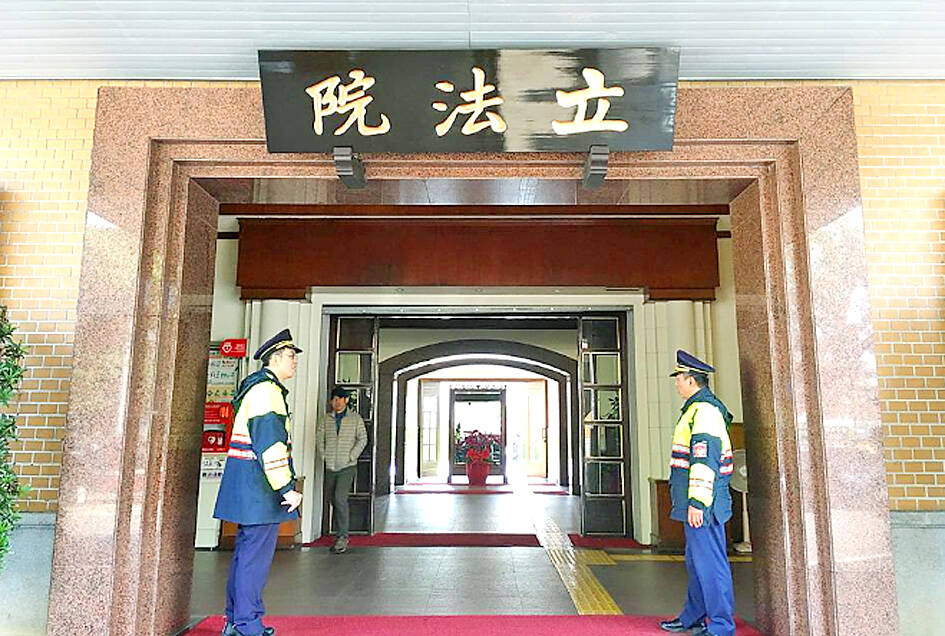Democratic Progressive Party (DPP) lawmakers have proposed an amendment to the National Security Act (國家安全法) that would ensure elected representatives have half the normal sentence added to their term if convicted of leaking state secrets.
Chinese Nationalist Party (KMT) Legislator Ma Wen-chun (馬文君) is under investigation for allegedly leaking confidential material about Taiwan’s Indigenous Defense Submarine Program to South Korea.
Local media reported that during closed-door meetings of the legislature’s Foreign Affairs and National Defense Committee at which details of the submarine program were reviewed, Ma brought in a personal device to call her aides, and refused to sign a confidentiality agreement.

Photo: Lin Liang-sheng, Taipei Times
DPP lawmakers on Thursday last week filed a motion to change the committee’s rules, which was passed.
The amended rules stipulate that no electronic or recording devices, including smart watches and bracelets, legislature-issued communication devices, and cameras, are allowed on lawmakers, officials and staffers attending the committee’s closed-door meetings.
In addition, they cannot keep handwritten notes, must sign a confidentiality agreement and can be searched, the rules state.
However, DPP Legislator Lin Ching-yi (林靜儀) said the new rules do not prevent legislators who hear confidential government or military information from passing it on.
“It is almost impossible to guard against representatives elected by our democratic system who are working for an enemy state,” she said.
Lawmakers have many opportunities to access military files and national secrets, and have the authority to ask government agencies to provide them with confidential material for review, she said.
“Yet when they ... leak national secrets, they receive the same punishment as any member of the public,” Lin said.
Lin and other DPP legislators proposed a supplement to Article 7 of the act and have received the signatures needed to ensure it is discussed by the legislature.
The proposed amendment refers to the definition of public officials in Article 2 of the Civil Servants Election and Recall Act (公職人員選舉罷免法), saying that they should face a punishment proportional to their responsibilities “to ensure our national security is safeguarded.”
The proposed amendment says that those serving in office, or who are retired — whether they are in government or the armed forces — must have half the normal sentence added to their term if convicted under Article 2 of the National Security Act.
Separately, DPP Legislator Lin Tai-hua (林岱樺) had proposed an amendment to the Rules of Procedure of the Legislative Yuan (立法院議事規則), which passed a first reading on Oct. 6.
The proposed amendment requires all legislators, invited government officials and legislature staffers to sign a confidentiality agreement when attending closed-door meetings, or be refused access.

US President Donald Trump yesterday announced sweeping "reciprocal tariffs" on US trading partners, including a 32 percent tax on goods from Taiwan that is set to take effect on Wednesday. At a Rose Garden event, Trump declared a 10 percent baseline tax on imports from all countries, with the White House saying it would take effect on Saturday. Countries with larger trade surpluses with the US would face higher duties beginning on Wednesday, including Taiwan (32 percent), China (34 percent), Japan (24 percent), South Korea (25 percent), Vietnam (46 percent) and Thailand (36 percent). Canada and Mexico, the two largest US trading

AIR SUPPORT: The Ministry of National Defense thanked the US for the delivery, adding that it was an indicator of the White House’s commitment to the Taiwan Relations Act Deputy Minister of National Defense Po Horng-huei (柏鴻輝) and Representative to the US Alexander Yui on Friday attended a delivery ceremony for the first of Taiwan’s long-awaited 66 F-16C/D Block 70 jets at a Lockheed Martin Corp factory in Greenville, South Carolina. “We are so proud to be the global home of the F-16 and to support Taiwan’s air defense capabilities,” US Representative William Timmons wrote on X, alongside a photograph of Taiwanese and US officials at the event. The F-16C/D Block 70 jets Taiwan ordered have the same capabilities as aircraft that had been upgraded to F-16Vs. The batch of Lockheed Martin

China's military today said it began joint army, navy and rocket force exercises around Taiwan to "serve as a stern warning and powerful deterrent against Taiwanese independence," calling President William Lai (賴清德) a "parasite." The exercises come after Lai called Beijing a "foreign hostile force" last month. More than 10 Chinese military ships approached close to Taiwan's 24 nautical mile (44.4km) contiguous zone this morning and Taiwan sent its own warships to respond, two senior Taiwanese officials said. Taiwan has not yet detected any live fire by the Chinese military so far, one of the officials said. The drills took place after US Secretary

THUGGISH BEHAVIOR: Encouraging people to report independence supporters is another intimidation tactic that threatens cross-strait peace, the state department said China setting up an online system for reporting “Taiwanese independence” advocates is an “irresponsible and reprehensible” act, a US government spokesperson said on Friday. “China’s call for private individuals to report on alleged ‘persecution or suppression’ by supposed ‘Taiwan independence henchmen and accomplices’ is irresponsible and reprehensible,” an unnamed US Department of State spokesperson told the Central News Agency in an e-mail. The move is part of Beijing’s “intimidation campaign” against Taiwan and its supporters, and is “threatening free speech around the world, destabilizing the Indo-Pacific region, and deliberately eroding the cross-strait status quo,” the spokesperson said. The Chinese Communist Party’s “threats